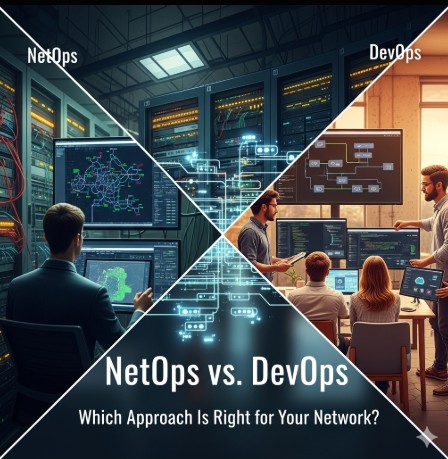The digital landscape demands ever-increasing speed and agility. For organizations relying on robust and reliable networks, the choice between traditional NetOps and the more modern DevOps approach is critical. This article will delve into the core differences between NetOps vs DevOps, outlining their strengths and weaknesses to help you determine the best strategy for your network infrastructure.
Table of Contents
Understanding NetOps
NetOps, short for Network Operations, represents the traditional approach to network management. It’s characterized by a siloed structure, with specialized teams focusing on specific network functions. NetOps teams typically handle tasks such as:
- Network monitoring and troubleshooting
- Network security management
- Capacity planning and optimization
- Implementing and maintaining network infrastructure
NetOps often relies on manual processes, established procedures, and a focus on stability and security. While this ensures reliability, it can also lead to slow deployment cycles and limited adaptability to changing business needs.
Traditional NetOps Workflow
A typical NetOps workflow involves a series of sequential steps, often involving extensive documentation and change management processes. This methodical approach can be slow, especially when dealing with urgent issues or rapid changes.
Limitations of NetOps
- Slow deployment of new services and features.
- Limited collaboration between different teams.
- Challenges in adapting to cloud environments and agile methodologies.
- Potential for human error due to manual processes.
Understanding DevOps
DevOps, a portmanteau of “Development” and “Operations,” is a set of practices that emphasizes collaboration and automation to shorten the systems development life cycle and provide continuous delivery with high software quality. While initially focused on software development, its principles have been increasingly adopted for network management, leading to the emergence of “DevNetOps” or simply extending DevOps principles to network infrastructure.
DevOps Principles Applied to Networking
When applied to networks, DevOps promotes automation of network provisioning, configuration, and management. It fosters collaboration between development and operations teams (and potentially security teams, creating a DevSecOps approach), leading to faster deployment cycles and increased efficiency. Key aspects include:
- Infrastructure as Code (IaC): Defining and managing network infrastructure through code, allowing for automation and version control.
- Continuous Integration/Continuous Delivery (CI/CD): Automating the testing and deployment of network changes.
- Monitoring and Logging: Implementing comprehensive monitoring and logging to proactively identify and address issues.
- Automation: Automating repetitive tasks, such as configuration management and troubleshooting.
Example: Ansible for Network Automation
Ansible, a popular automation tool, can be used to manage network devices. Here’s a simplified example of configuring an interface on a Cisco switch:
- hosts: cisco_switches
tasks:
- name: Configure interface GigabitEthernet1/1
ios_config:
lines:
- interface GigabitEthernet1/1
- description "Connection to Server Room"
- ip address 192.168.1.1 255.255.255.0
- no shutdown
This simple Ansible playbook demonstrates how code can automate a network configuration task, eliminating manual intervention and reducing the potential for errors.
NetOps vs DevOps: A Direct Comparison
The core difference between NetOps vs DevOps lies in their approach to network management. NetOps emphasizes manual processes, while DevOps focuses on automation and collaboration. This leads to significant differences in various aspects:
| Feature | NetOps | DevOps |
|---|---|---|
| Deployment Speed | Slow | Fast |
| Automation | Limited | Extensive |
| Collaboration | Siloed | Collaborative |
| Change Management | Rigorous and slow | Agile and iterative |
| Risk Management | Emphasis on stability | Emphasis on continuous integration and testing |
Choosing the Right Approach: NetOps vs DevOps
The best approach, NetOps or DevOps, depends on your organization’s specific needs and context. Several factors influence this decision:
- Network Size and Complexity: Smaller, less complex networks may benefit from a simpler NetOps approach, while larger, more complex networks often require the agility and automation of DevOps.
- Business Requirements: Businesses requiring rapid deployment of new services and features will likely benefit from DevOps. Organizations prioritizing stability and security above all else may find NetOps more suitable.
- Existing Infrastructure: The level of automation and tooling already in place will affect the transition to a DevOps model. A gradual migration might be more realistic than a complete overhaul.
- Team Expertise: Adopting DevOps requires skilled personnel proficient in automation tools and agile methodologies. Investing in training and upskilling may be necessary.
Frequently Asked Questions
Q1: Can I use both NetOps and DevOps simultaneously?
Yes, a hybrid approach is often the most practical solution. You might use DevOps for new deployments and automation while retaining NetOps for managing legacy systems and critical infrastructure that requires a more cautious, manual approach.
Q2: What are the biggest challenges in transitioning to DevOps for network management?
The biggest challenges include a lack of skilled personnel, integrating DevOps tools with existing infrastructure, and overcoming resistance to change within the organization. A well-defined strategy and proper training are essential for a successful transition.
Q3: What are some popular tools used in DevOps for network automation?
Popular tools include Ansible, Puppet, Chef, and Terraform. Each offers unique capabilities for automating different aspects of network management. The choice depends on your specific needs and existing infrastructure.
Q4: Is DevOps only applicable to large organizations?
While large organizations may have more resources to dedicate to a full-scale DevOps implementation, the principles of DevOps can be adapted and scaled to fit the needs of organizations of any size. Even small teams can benefit from automation and improved collaboration.

Conclusion
The decision between NetOps vs DevOps is not an either/or proposition. The optimal approach often involves a hybrid strategy leveraging the strengths of both. Carefully assessing your organizational needs, existing infrastructure, and team capabilities is crucial in selecting the right combination to ensure your network remains reliable, scalable, and adaptable to the ever-evolving demands of the digital world. Choosing the right approach for your NetOps vs DevOps strategy will significantly impact your organization’s ability to innovate and compete in the modern technological landscape.
For further reading on network automation, refer to resources like Ansible’s Network Automation solutions and the Google Cloud DevOps documentation. Thank you for reading the DevopsRoles page!
